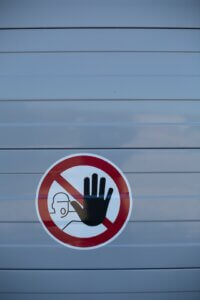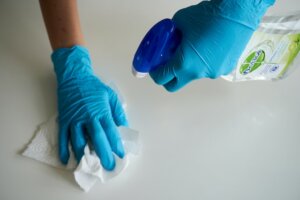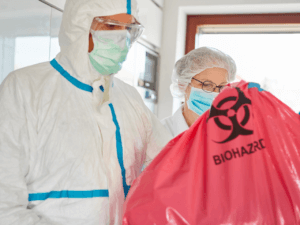Forensic Cleaning: Sanitisation Vs Decontamination
Forensic Cleaning: The Difference Between Sanitisation and Decontamination
Summary
The article explains the key differences between sanitisation and decontamination in forensic cleaning. While sanitisation reduces pathogens to safe levels, decontamination aims to completely eliminate all hazardous substances. The choice between the two depends on the type of contamination and associated risks. Both methods adhere to specific guidelines and have varying cost implications.
When it comes to forensic cleaning, there’s a vast array of information available that often leaves professionals and laypersons alike, perplexed. In particular, the terms sanitisation and decontamination are frequently used interchangeably. However, these terms are not synonymous and hold distinct meanings and applications, especially in the nuanced field of forensic cleaning. Today, we’re delving into these crucial distinctions, to equip you with the precise knowledge you need to maintain the safest and most sanitary conditions possible.
Why Forensic Cleaning Matters
Before we get into the technicalities, it’s vital to grasp why forensic cleaning is paramount in specific scenarios. This type of cleaning comes into play in situations involving crime scenes, unattended deaths, hazardous material spills, and biohazard contamination. It’s the linchpin in returning a location to a habitable and safe condition, ensuring that no biological or chemical threats linger.
Understanding Sanitisation in Forensic Cleaning
Sanitisation is the process of reducing the number of bacterial contaminants to safe levels as judged by public health standards. In forensic cleaning, sanitisation generally pertains to the elimination of dangerous bacteria and viruses to ensure that a space becomes habitable once again.
Methods of Sanitisation
The methods used for sanitisation often include hot water and steam, which are efficient in killing bacteria. Chemical sanitisers such as hydrogen peroxide, quaternary ammonium compounds, and alcohol are also commonly utilised in this stage.
When Sanitisation is Recommended
Sanitisation is most appropriate for spaces that are already generally clean but may have been contaminated with biological matter such as bodily fluids or food residue. It is a less rigorous process than decontamination but serves to bring the environment back to acceptable health standards.
Decontamination: The Rigorous Alternative
Contrary to sanitisation, decontamination is the more stringent process. It not only aims to reduce harmful substances but also to eliminate them. Decontamination removes harmful bacteria, viruses, and even non-living substances like chemicals and toxins.
Methods of Decontamination
Decontamination often involves the use of specific chemical solutions designed to break down harmful substances at a molecular level. In some cases, ultraviolet (UV) lighting technology is used for air and water purification.
When Decontamination is Necessary
Decontamination is commonly reserved for extreme scenarios, such as methamphetamine lab clean-ups, chemical spills, or crime scenes involving hazardous materials. It goes beyond simple cleaning and sanitisation to provide a comprehensive, deep-cleaning solution that ensures all harmful substances are eradicated.
Sanitisation vs. Decontamination: The Key Takeaways
To summarise, sanitisation lowers the number of pathogens to a safe level but does not completely eradicate them. On the other hand, decontamination is a more intensive process that seeks to completely eliminate all hazardous substances, whether living or non-living.
Cost and Time Implications
While sanitisation is generally quicker and more cost-effective, decontamination is a longer, more labour-intensive process that can be significantly more expensive.
Regulatory Guidelines
Each process adheres to specific regulatory guidelines and standards. For sanitisation, the focus is on meeting public health standards. Decontamination often falls under more stringent rules, particularly when hazardous chemicals and biohazards are involved.
Choosing the Right Approach
Determining whether sanitisation or decontamination is necessary depends on multiple factors, including the type of contaminant, the extent of contamination, and the applicable regulatory requirements. Always consult with forensic cleaning experts to make an informed decision that ensures the highest safety standards.
In conclusion, understanding the difference between sanitisation and decontamination in forensic cleaning is crucial for maintaining a safe and hazard-free environment. Each method has its applications, costs, and effectiveness, and understanding these can make all the difference in your approach to forensic cleaning.
FAQs
What is Forensic Cleaning and Why is it Necessary?
Forensic cleaning is a specialized cleaning process designed to deal with potentially hazardous situations, such as crime scenes, unattended deaths, or chemical spills. It’s necessary to ensure that a location is made safe and habitable, eliminating biological, chemical, or other types of contaminants.
How Does Forensic Cleaning Differ from Regular Cleaning?
Forensic cleaning goes beyond regular cleaning by not only removing visible dirt but also sanitizing and decontaminating the area to remove hazardous materials. Specialized equipment, chemicals, and techniques are used to ensure that no contaminants remain.
Can I Do Forensic Cleaning Myself?
It is strongly recommended that you hire certified professionals for forensic cleaning. These experts are trained in safely and effectively removing hazardous materials and contaminants. Doing it yourself could pose serious health risks and may not be thorough, leaving dangerous substances behind.
Why Choose AllAces?
It is always best to engage expert service providers when facing potentially contaminated forensic or biohazard materials. Professionals, such as AllAces, understand the associated risks inherent in contaminated scenes and substances with forensic cleaning. Our technicians receive training and accreditation to handle sensitive materials and are equipped with the appropriate protective gear. It is also beneficial to the authorities to have a licensed and experienced company involved in mitigating these risks.



